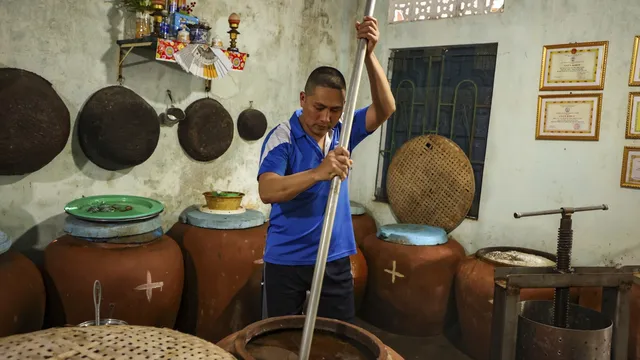
Climate change and overfishing jeopardize Vietnam's iconic fish sauce production
2025-03-27 00:45- Bui Van Phong maintained his family's fish sauce tradition in Da Nang, Vietnam, for over 50 years.
- Climate change and overfishing have led to a decline in anchovy stocks, affecting fish sauce production.
- Many families are considering leaving the business as high anchovy prices threaten their livelihoods.
Express your sentiment!
Insights
In Da Nang, Vietnam, Bui Van Phong has upheld a centuries-old tradition of fish sauce production since the end of the Vietnam War 50 years ago. He chose to remain in his village, allowing the family business of crafting nuoc mam to flourish into its fourth generation with his son, Bui Van Phu. Fish sauce holds significant cultural importance in Vietnam, serving as a vital condiment in its cuisine. However, recent challenges from climate change and overfishing have hindered the supply of anchovies, the primary ingredient in making fish sauce, threatening both its production and the families that rely on it for their livelihoods. Scientists warn that rising global temperatures and overexploitation of marine resources are jeopardizing fish stocks in the South China Sea, which is crucial for the fishing community. The continuing trend of overfishing will not only affect the anchovy population but may also lead to a rise in smaller, less nutritious fish species. This depletion poses a risk to numerous families engaged in fish sauce production, as they struggle with increased costs and dwindling stocks of high-quality anchovies. Bui Van Phu has expressed concern that many families might abandon their time-honored fish sauce production due to elevated anchovy prices. As the global demand for fish sauce surges, particularly from markets in the U.S., Europe, and Japan, producers are faced with both an opportunity and a dilemma. They must improve food safety standards to compete on the international stage while navigating the local challenges of sustainable fish sourcing. Despite the risks, these producers remain deeply committed to their craft, recognizing that each family possesses unique secrets to its fish sauce recipes that have been passed down through generations. Fish sauce is more than a mere ingredient for many in Vietnam; it embodies cultural heritage and familial identity. The story of Bui Van Phong and his son highlights the ongoing battle to preserve this artisanal legacy in the face of adversity. Without significant changes to address the environmental issues confronting their industry, the future of fish sauce production in Vietnam remains uncertain, with potentially dire consequences for thousands of families who depend on this age-old tradition.
Contexts
Climate change is having a profound impact on fish populations in Vietnam, with significant implications for biodiversity, food security, and the livelihoods of local communities. The rising temperatures, altering precipitation patterns, and increasing frequency of extreme weather events are changing the aquatic ecosystems that support fish species in both freshwater and marine environments. In particular, the Mekong River, which is vital for numerous fish species, is experiencing changes in water flow and quality due to climate-related factors. This threatens the habitats of many fish species that are crucial for local fisheries, which are a primary source of protein for millions of Vietnamese people. Furthermore, ocean acidification and rising sea temperatures are affecting marine fish populations along the Vietnamese coastline. The numerous coral reefs that provide essential breeding and feeding grounds for many fish species are under threat, which could lead to a decline in fish stocks. Some species may struggle to adapt to the changing conditions, while others may shift their distribution, leading to competition among species and altering the balance of marine ecosystems. This shift not only impacts fish populations but also affects the overall health of the marine environment, which is critical for sustaining local economies that depend on fishing and tourism. In addition to direct impacts on fish populations, climate change also influences the socio-economic aspects of fishing communities in Vietnam. With declining fish stocks, fishermen may face reduced catches, leading to diminished income and food security. Lower fish availability can lead to higher prices in local markets, disproportionately affecting low-income families who rely heavily on fish as their primary source of nutrition. Moreover, the livelihoods of those involved in fish processing and trade may also be jeopardized, resulting in broader economic unrest within communities that depend on the fishing industry for their survival. To address these challenges, it is crucial to adopt sustainable management practices that take into consideration the effects of climate change on fish populations. This includes implementing regulations to manage fish stocks more effectively, protecting critical habitats, and investing in climate-resilient fisheries practices. The Vietnamese government, alongside local and international organizations, must prioritize research and monitoring of fish populations to better understand the impacts of climate change. Collaborative efforts are necessary to ensure the resilience of both fish populations and the communities that depend on them for their socio-economic well-being. These strategies will play a vital role in safeguarding the future of fish populations in Vietnam amid the ongoing challenges posed by climate change.